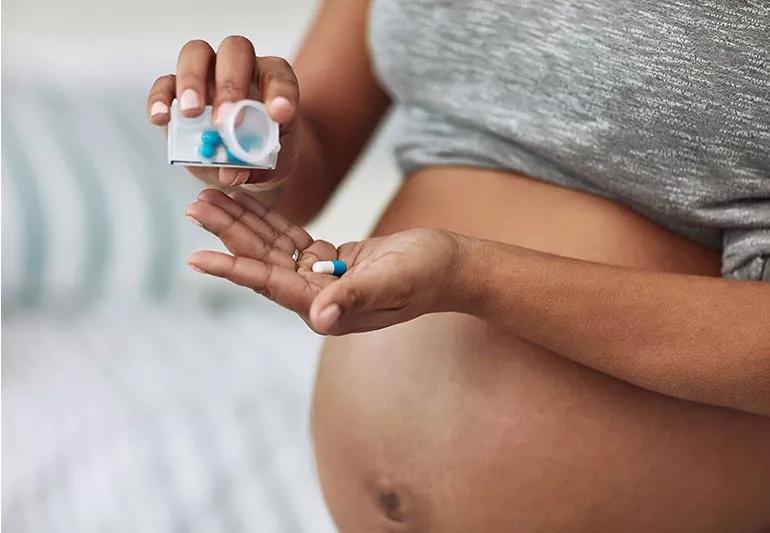An expert outlines the best timing options

Image content: This image is available to view online.
View image online (https://assets.clevelandclinic.org/transform/d1814e09-4d2e-4b5a-a2fd-701478237eca/PrenatalVitaminsl-1178021244-770x533-1_jpg)
A pregnant person pours a blue and white pill into hand with shirt pulled up over bare belly
Making sure you’re getting all the vitamins and nutrients you need to maintain good health is always important. It’s especially essential when you’re pregnant, as your developing fetus depends on you for all of those needs.
Advertisement
Cleveland Clinic is a non-profit academic medical center. Advertising on our site helps support our mission. We do not endorse non-Cleveland Clinic products or services. Policy
Prenatal vitamins play a big role in helping keep both you and your baby healthy throughout the term of your pregnancy. But the ins and outs of adding them to your routine can raise a lot of questions. We turned to clinical pharmacy specialist Morgan King for answers.
The big reason why people who are pregnant should take prenatal vitamins is pretty simple: you need to keep both you and your baby healthy. “All of the nutrients and vitamins a pregnant woman takes in will go to the baby first,” says King. “The baby needs that nutrition to grow.”
But the mother also needs those vitamins. “While the vitamins and nutrients are essential for the baby’s development, the mother also needs key vitamins for both her and the baby,” King notes.
Some of those include:
Most prenatal vitamins should contain these, particularly iron and folic acid, both of which are essential. Check with your healthcare provider just in case, though, because if your prenatal vitamins don’t contain certain nutrients, they might recommend a stand-alone dose.
Advertisement
If you’re planning on getting pregnant, King says you should start taking prenatal vitamins as soon as you begin trying. “When an Ob/Gyn looks at dating a pregnancy, they typically start from the patient’s last menstrual period. That means when you find out you’re pregnant, you could be four to six weeks along in your pregnancy already,” she says.
Not all pregnancies are planned, of course, and King says that if you’re not taking prenatal vitamins at the time you discover you’re pregnant, you should start as soon as possible. “Major development happens in the first trimester, those first 12 weeks,” she says. “The spinal cord and brain are developing so those vitamins help with that.”
Additionally, mothers who are breastfeeding are encouraged to continue taking prenatal vitamins to keep providing those nutrients via breast milk.
No, prenatal vitamins won’t help you conceive, says King.
King adds that it’s never too late to start taking prenatal vitamins, either. “While it’s certainly best to start taking them as soon as possible, the baby is developing and growing during the entire pregnancy,” she says.
Once you start taking prenatal vitamins, you should stop taking your daily multivitamin. “You want to make sure you stay within that recommended daily amount of each vitamin,” King says. “While you’ll generally be okay if you go over 100% for some vitamins, others, like Vitamin A, can lead to certain complications.”
If you’re not sure about your intake, check with your healthcare provider who can help you plan out what, if any, extra vitamins you may need. “It’s not out of the question that a mother may need extra folic acid if they’ve had previous complications or extra iron if they’re anemic,” King adds.
“No time of day is any better than another to take prenatal vitamins,” King says.
There are a variety of types of prenatal vitamins you can choose from and it doesn’t matter which you take. “If you look at an ingredients list comparing tablets, capsules and even gummies, the components will be pretty similar,” King says.
Checking the ingredients is important, too, to make sure you’re getting everything you need. Most gummies don’t contain iron, King says, since young children may try to snag some thinking they’re candy and too much iron is dangerous for children.
King says if you’re not breastfeeding your child, it’s okay to switch back to a daily multivitamin after birth.
If you’re breastfeeding, it’s encouraged to continue taking prenatal vitamins until you stop breastfeeding to keep taking in nutrients that provide benefits for both you and your baby.
But, King adds, if you choose to switch back to your daily multivitamin while breastfeeding, that’s okay, too. “You want to make sure you’re optimizing your nutrition since you’re providing those nutrients to the baby. As long as you’re getting the appropriate amount of those vitamins and nutrients, that’s what’s most important.”
Advertisement

Delivered every Tuesday!
Sign up for our Health Essentials emails for expert guidance on nutrition, fitness, sleep, skin care and more
It's a letter about the news!

Every two weeks once
Sign up for our Health Essentials emails for expert guidance on nutrition, fitness, sleep, skin care and more.
Learn more about our editorial process.
Advertisement
The lowdown on folate, calcium, vitamin D and more
B vitamins do a lot for your body, like activate enzymes that give you energy, create blood cells and prevent DNA damage
Bleeding is a risk and warrants taking care, but the reward of this lifesaving medication is great
Severe and debilitating headaches can affect the quality of your child’s life
With repeat injections over time, you may be able to slow the development of new wrinkles
Type 2 diabetes isn’t inevitable with these dietary changes
Applying a hot or cold compress can help with pain
Pump up your iron intake with foods like tuna, tofu and turkey